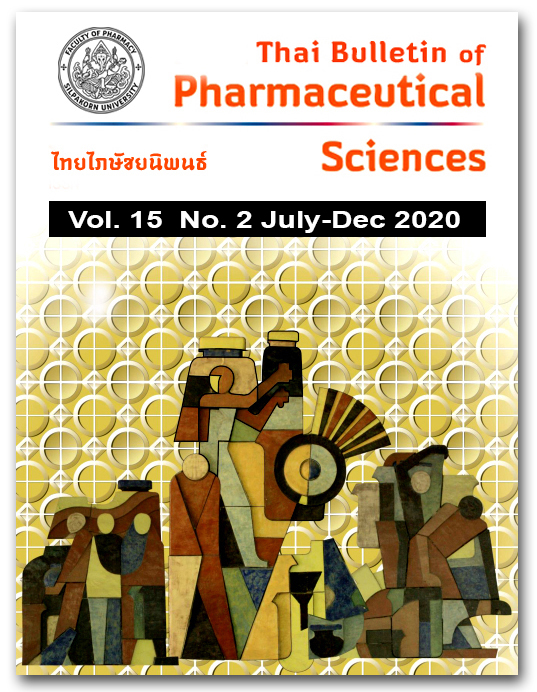PREDICTING FACTOR OF PSYCHO-SOCIAL FACTORS ON BEHAVIOR OF HEALTH PRODUCT CONSUMPTION OF ORYOR NOI STUDENTS IN HEALTH REGION 5
DOI:
https://doi.org/10.69598/tbps.15.2.31-46Keywords:
health product, health product consumption, Oryor Noi studentAbstract
This research aims to study health products’ consumption behavior of Oryor Noi Students (ONS), to analyze bio-social factors which affect the student’s behaviors related to behavior of health product consumption of leader students in Oryor Noi Student Club and to examine psycho-social factors’ relationship in the students and the predictive power of regression model on behavior of health product consumption of leader students in Oryor Noi Student Club. Survey research was employed by collecting data from Oryor Noi Student Club in Health Region 5 by questionnaire using. Data of 590 samples were analyzed by using both descriptive and inferential statistics at 0.05 statistical significance level. The results showed as the following: The most of oryor noi students were female (71.2%), 17 years-olds (31.4%), studying in senior high school (43.4%), receiving more than 50 baht /day for meal / snack (62.5%), and their parents were company employee (48.6%) The most Appropriate on their health products’ consumption was when they were sick they will go to the doctor or buy drugs from pharmacist in drug store. The bio-social factors that affected their health products’ consumption were sex and parents’ occupation. Predictor variables of psycho-social factors on their appropriate health products’ consumption were mental health variable (A1), committing self-control variable (A2), achievement motivation variable (A3), internal locus of control variable (A4), influence of media variable (B1) and social norm variable (B2) as equation: appropriate health products’ consumption = 0.771 + 0.073(A1) + 0.111(A2) + 0.133(A3) + 0.084(B1) + 0.450(B2) - 0.070(A4).
References
Food and Drug Administration. The Public Consumer Affairs Division. Report of health behavior survey of "Oryor Noi" students 2016 [Internet]. Nonthaburi: The Division; 2016 [cited 2020 Apr 3]. Available from: https://db.oryor.com/ databank/uploads/fda/0538563001500621182_file.pdf (in Thai)
Cochran WG. Sampling techniques. 3rd ed. New York: John Wiley & Sons; 1977.
Bhanthumnavin D. Research in psycho-behavioral science in Thailand. J Res Methodol [Internet]. 2000 [cited 2020 Apr 3];13(3):25-48. Available from: https://portal.edu.chula. ac.th /pub/jrm/index.php/jrm/article/view/315 (in Thai)
Bhanthumnavin D. Antecedents of mindful risk-taking behavior in secondary school students: a path analytic approch. Warasan Phuetikammasart [Internet]. 2015 [cited 2020 Apr 3];21(1):75-94. Available from: https://so06.tci-thaijo.org/index.php/BSRI/article/view/29900 (in Thai)
Onyon N. Factors affecting on environmental conservation behaviors of upper primary students. J of GradVRU. 2019;13(3):75-88. (in Thai)
Praneetvatakul B. Psychosocial as correlates of communicable disease preventive behavior in daily life of undergraduate students. [master's thesis]. Bangkok: ational Institute of Development Administration; 2017. (in Thai)
Suprasamut D. Integration of psychological and situational antecedents of work behavior in cabin crew. [Dissertation]. Bangkok: National Institute of Development Administration; 2015. (in Thai)
Prongprommarat J. The causal variable influencing the AIDs prevention behavior of secondary school students in Nakhon Ratchasima Province. NRRU Commun Res J. 2018;12(2):52-62. (in Thai)
Thumwong S, Jinnge P, Supparerkchaisakul N. Causal relationship model of financial management behavior with a Buddhist approach. Warasan Phuetikammasart [Internet]. 2018 [cited 2020 Apr 13];24(2):157-72. Available from: https://so06.tci-thaijo.org/index.php/BSRI/article/view/ 132301 (in Thai)
Ruangying J, Jorajit S, Janyam K. Food consumption behavior of adolescents in Songkhla Province: synthesis of literacy and factors influencing food consumption behavior. J Lib Arts (PSU). 2016;8(1):245-64. (in Thai)
Lapi-e A, Saksung A, Tumsuwan P, Nunkliang S, Yunu H, Chaichana S. Relation of pereception and the influence of media affect to behavior modification change smoking of youth at vocational level in the three southernmost provinces. Public Health Policy Law J [Internet]. 2017 [cited 2020 Apr 13];3(3):321-4. Available from: https://so05.tci-thaijo.org/index.php/journal_law/article/view/161676 (in Thai)
Yaemyuen A. Sufficient mind, psychological characteristics, and situations predicting sufficiency-economy behavior of youths: an analysis of structural equation modeling. J Soc Dev [Internet]. 2017 [cited 2020 Apr 13];19(1):23-38. Available from: https://so04.tci-thaijo.org/index.php/jsd/article/view/ 89831 (in Thai)
Klayprayong W, Bhanthumnavin D. Psychological characteristics, situational factors and norm perception related to attitude and acceptance of nuclear powerplant in Thai undergraduate students. J Bus Adm (APHEIT). 2015;4(2):51-61. (in Thai)
Downloads
Published
How to Cite
Issue
Section
License
All articles published and information contained in this journal such as text, graphics, logos and images is copyrighted by and proprietary to the Thai Bulletin of Pharmaceutical Sciences, and may not be reproduced in whole or in part by persons, organizations, or corporations other than the Thai Bulletin of Pharmaceutical Sciences and the authors without prior written permission.



